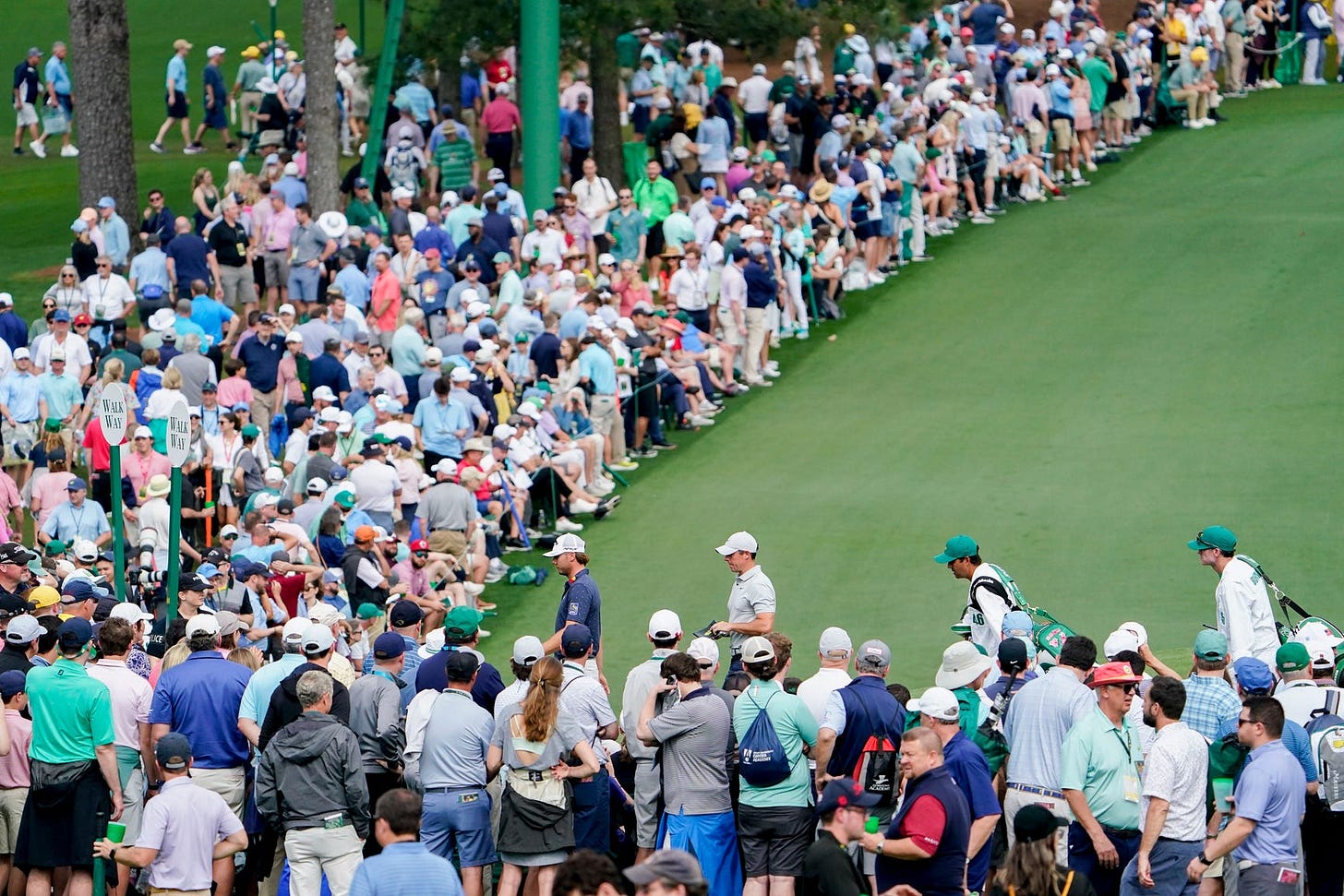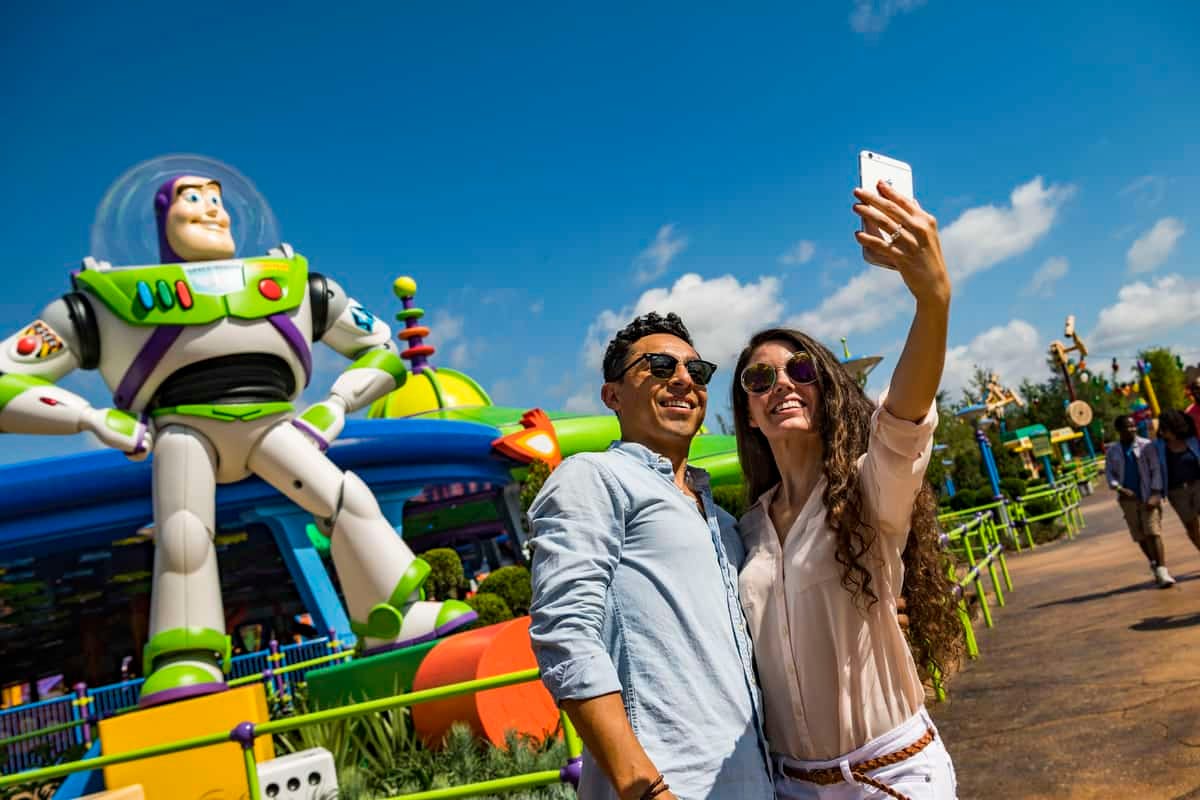What The Masters can teach us about how we use technology
A tradition like no other, that demands you to be fully present, like no other
I’m a big golf fan.
That doesn’t mean I’m especially great at playing golf, but I love doing it anyway. I love being outdoors on a cool day, surrounded by the green foliage, arguing with a little white ball that never seems to go where you want it to. It is the single most frustrating and enjoyable sport all at once.
My affinity doesn’t stop there. I’ve been to PGA major championships, LIV events, and even attended The Presidents Cup last year. And yes, I’ve also been lucky enough to attend The Masters, which above all the others is a truly once-in-a-lifetime experience.
As my family can attest, watching the final rounds of The Masters is an annual tradition for me. Dad takes over the TV and will watch coverage from morning to evening, flipping between various camera views. And doing that this past weekend brought back memories of my own trip down to Augusta, and some of my lessons learned there.
Here’s one that most people don’t know until you go: You can’t bring your phone onto Augusta National. Yes, you read that right — no phones allowed at all.
When you first realize this, your mind races a bit. Think about the last time you went anywhere without your phone. And I don’t mean when you put it in airplane mode on your last flight, or silent mode while you slept, but actually (and purposefully) left it behind? Can’t pinpoint when it was? Don’t worry, you’re not alone.
Phones have become an extension of us. We carry them everywhere, look at them over 144 times a day, cover them in cases, bedazzle them, and shed a tear when we break them. They are our gateway to friends and colleagues, provide us with hours of mindless scrolling, and store the pictures we took from the last few years. They hold all our secrets and gateways in life, and we protect them like they are one of us.
So when you walk into Augusta National and realize you have to give that up, it sparks a natural bit of panic:
How will someone get a hold of me?
What if I miss an important phone call or text message?
Can I last a whole day without it?
Fortunately, the course does have phones on property that you can use, graciously sponsored by AT&T, that let you call anywhere in the world for free … provided that you remember the number or wrote it down in advance.
(I remember calling my golf buddies from one of these old school phones, and they were actually out playing a round at the time. They could see “Augusta National” on their caller ID, which prompted a laugh … or maybe an “eff you,” I can’t recall. 😂)
But once you get over that initial shock, something crazy happens. You don’t care. Without your phone you are fully immersed in the moment, lost almost, and it becomes an amazing, perhaps transformative, experience.
No one to call or text you. No Facebook or Instagram feed to check. No pictures to take. No work emails to check on. Nothing but you, your fellow golf fans, azaleas, cheap concessions, and the gorgeous grounds.
It’s kind of cathartic, in a way. At most professional golf tournaments, you use their app to find your way around the course. A few of them even set up event-specific Wi-Fi so you can track golfers and shots in realtime. As a result, you can zoom around the course and see exactly who you want at the exact right time. But you are also forced to lug a charger bank around with you as a result.
And when you’ve stopped to actually watch the golf, you’re often watching it through the screen of your phone as you take a picture or a video of the action. You’re then texting those images to your friends as you walk, or posting them to social media. You’re experiencing and sharing it all in real time, at the same time, in some weird mashup. It is awesome and exhausting, all at once.
At Augusta National, all you do is watch golf.
Take a look at the photo above.
No one is looking at their phone. No one is craning their arms to get a better shot, or taking a selfie with the golfer walking by. No one is missing the moment by texting someone else, or posting the images to Instagram to brag to the world. You all sit together and watch golf. You talk to each other. The number of random conversations you end up having is actually remarkable.
If you want to follow a player on the course, then you need to go old school: Grab the printed tee sheet and course map at the entrance, figure out where they are, and find your way there. It goes something like this: “OK, they teed off at 2:10. It’s now ~3 pm, so they are probably on the 4th or 5th hole. No. 6 is a short par 3, so why don’t we go over there by the green so we can see them shoot into the green.”
Want to see who is winning? You have to find one of the many (non-digital) scoreboards and decipher it. Red means they are under par, green means even or over, and, since it is mechanical, it doesn’t dynamically sort itself by the lowest scores to show a true leaderboard. Augusta has many famous scoreboards throughout the course, but there are only about a dozen of them. So, just like players, you may actually spend most of your time on the course not knowing who’s leading and by what score.
At a golf course, watching golf — what an idea! 💡
Master-ing technology
The irony of The Masters is that, while they don’t allow phones on the property and you have to track the action with sheets of paper and low-tech scoreboards, they have the best absolute digital experience of any event for those at home.
The Masters app is award-winning — and rightly so. You can watch multiple HD quality streams, cast it to your TV, and track your favorite players and each of their shots in realtime. The CBS coverage is carefully choreographed with birds chirping (some think they are fake) with the commentators using specific words the club mandates to make it all sound consistent and traditional. (For example, you can’t call it the “rough”; it’s the “first cut.”)
All of this is free. Sure, certain days and times for the tournament were either on ESPN+ or Paramount+, but the main broadcast was on free-to-air CBS, and The Masters app is available for everything else (including the broadcast) for free. How many major sporting events nowadays are totally free to watch and experience digitally?
The juxtaposition of the on-course experience vs. the in-home experience is remarkable. Almost like it was designed that way.
Take Disney World as a contrast. A few years ago I took the family to Orlando. Now, I’m a big Disney fan and thoroughly enjoy the parks, but if you’ve been to a park in the past 5-7 years you’ll know it is not like it was when you were a kid. Word to the wise: Pack at least 2 battery packs for your phone.
Navigating the Orlando parks has been excruciatingly linked to their mobile app for years now. To say that you spent 75% of your time on the phone while in the park is conservative, if not a vast understatement. You use the phone to navigate from attraction to attraction, to order food, to wait in a virtual queue for certain rides, to check into your room, to pay, you name it. And because your phone is always out, you use it for more ancillary stuff like texting, social media, etc.
I recently read a book on Imagineering which I thought was fascinating. The amount of detail that the ride designers go into to create the desired experience is next-level. Some of it dates back to principles that Walt Disney himself came up with back when the world didn’t have iPhones. I’m not entirely sure the theme park experience today is what he envisioned , with people glued to their phones and missing the subtlety of the park itself, which was noted by Bob Iger when he took back the reins as Disney CEO a few years ago.
Living in the moment
Augusta National is lucky in that they fully control the experience they want to deliver. It is their golf course, with their rules: If you want to watch their tournament, you leave your phone at home. The exclusion of phones on the course is purposeful, and while it may sound silly at first, you quickly realize the benefits once you’ve experienced it.
The rest of the world isn’t as easy to control. I can barely keep phones off the table at dinner time, let alone when visiting the Eiffel Tower in Paris. For the rest of the time we walk around this planet, we’re constantly (and subconsciously) battling the digital urge to “be across everything” vs live in the moment. Maybe it is easier for The Masters to do, and not as easy for Disney World, but surely we can do better.
You should know by now with these articles that I’m going to bring it back to business travel. We need to be more thoughtful about the experiences we want our customers to have, not just the experiences we can deliver. One is about using the tools to provide the right information, at the right time, to maximize the opportunity to live in the moment; the other is about bombarding people with information simply because it’s available.
We don’t live in the moment enough in travel, especially corporate travel. I’m fortunate to have visited many countries and cities, and usually all I have to tell people about is what a hotel room or conference center looks like. I run from a flight to a meeting back to a flight; phone at the ready to answer a text or respond to an email.
We can all do better, and trends around “bleisure” (ie. the blending of a business trip and personal trip) support that people are starting to be more thoughtful about how they spend their time while on the road - not to mention broader generational changes in travel attitudes by greater number of Gen Z’s coming into the workforce.
So while I can’t control how much downtime your company gives you on the road or the policy for flying economy vs business class, I can suggest that we all take a page out of The Masters playbook: Remove distractions, try to be more present, and focus on what’s in front of you for a more immersive and meaningful experience.
In my last piece, I weighed the merits of using AI to search travel for us against searching for ourselves. But of course there’s a third option, one that patrons all over Augusta National employed: asking someone to point the way. In golf and in travel, it’s a perspective that technology alone cannot replicate.







